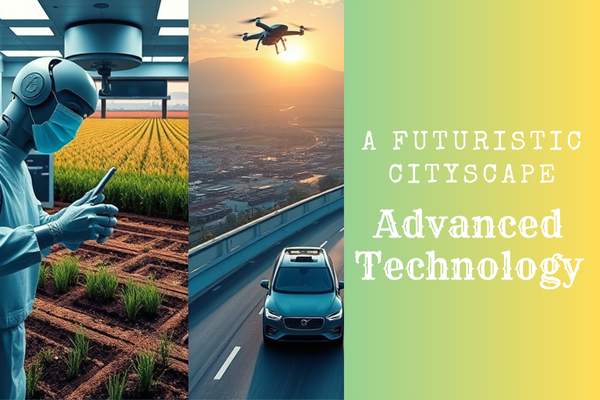Introduction : How Innovation Shapes Our Lives
A decade ago it was the future of technology was a distant dream but now it is unfolded; It is a powerful influence shaping our lives today. Continuous progress in artificial intelligence to innovations in logistics, financial functions, healthcare, renewable energy, transportation and manufacturing, the phrase “Future of Technology: Transforming Tomorrow, Today” perfectly encapsulates the rapid pace of progress we are witnessing. This blog explores how technological advancements are revolutionizing the way we live, work, and interact, offering insights into trends, industry impacts, and challenges ahead.
Key Trends Driving Technological Evolution
Technology advances fast, with certain drifts serving as the base for revolutionary innovations. The “Future of Technology: Transforming Tomorrow, Today” is being driven by changes such as:
Machine Learning and Artificial Intelligence
These technologies are facilitating smarter decision-making, from healthcare diagnostics to personalized shopping experiences.
5G Phone and Connectivity
The rise of 5G is revolutionizing how we communicate and access information, creating a world that’s more interconnected than ever.
Environment Tech
With climate change concerns, green technologies like carbon capture and renewable energy are at the forefront of innovation.
Quantum Computing
This emerging field promises to solve complex problems previously thought impossible, transforming industries like cybersecurity and logistics.
These trends signify that the future isn’t just about technological development—it’s about reshaping society for their betterment
Innovations Impacting Daily Life
Technology has knitted itself into the fabric of daily life, often in ways we don’t even realize where we moved like “era of plain old telephone systems(POTS) to 5G”. Now it is evident in how innovations are simplifying and enhancing our routines:
Smart Homes
Devices like voice assistants and automated lighting are making smart homes more suitable and energy-efficient.
Healthcare at Your Fingertips
Telemedicine, wearable health trackers, and AI-driven diagnostics have made healthcare more reachable and customized.
Education Reimagined
Digital tools, virtual reality (VR), and augmented reality (AR) are creating immersive and engaging learning environments for students worldwide.
Evolving Entertainment
Streaming services (Apple TV, Netflix, Amazon Prime, Disney Plus etc.), virtual concerts, and interactive gaming are redefining how we chill out and connect with others.


These examples highlight how the future of technology is shaping a more efficient and enjoyable present.
Industry-Specific Transformations
Healthcare:
AI-powered diagnostics, Personalized Treatment Plans, Robotic surgeries, and precision medicine are making healthcare more effective and accessible.
Facilitating the patient in early detection and cure of diseases like cancer or cardiovascular conditions.
Finance:
AI-powered systems analyze the vast amounts of data to identify unusual activities and minimize fraud in real-time.
AI has improved decision-making in areas like credit scoring, market predictions, and portfolio management.
Chatbot and virtual assistants offer 24/7 customer support, simplifying banking and day to day investment queries.
Automate complex financial agreements without human intervention, ensuring faster settlements.
Contactless payment platforms like Apple Pay, Google Pay, and UPI has revolutionized in payment system to make transactions seamless and helped small business at faster pace.
Robotic Process Automation (RPA) streamlines repetitive tasks like data entry, compliance checks, and reporting.
Agriculture:
Smart farming tools like drones, IoT sensors, and predictive analytics are optimizing crop yields and reducing waste.
Transportation
Autonomous vehicles and electric mobility are driving sustainable transportation solutions for the future.
Challenges and Ethical Considerations
While the “Future of Technology” brings immense promise, it also raises serious challenges, acknowledging and addressing these challenges will ensure that the benefits of technology are shared fairly and responsibly.
Privacy Concerns
Massive Data Collection
Technologies like IoT devices, social media, and mobile apps constantly collect personal information, often without users fully understanding the extent.
Facial Recognition Technology
While useful for security, its widespread use raises concern about being monitored in public spaces without consent.
Hacking Threats
As more data is stored digitally, systems become prime targets for hackers, exposing sensitive personal and financial information.
Consent Challenges
Users frequently agree to terms and conditions without understanding the full implications of their data being shared or sold.
Wearables and Health Data
Health apps, online medical apps collect sensitive information that could be exploited if not adequately protected.
Job Displacement
Advancement in technology could render certain jobs obsolete, demanding a focus on upskilling and reskilling the workforce.
Repetitive and manual tasks, particularly in industries like manufacturing, logistics, and retail, will be automated by robots and AI systems.
AI-driven tools can handle administrative tasks, data analysis, and even legal and financial functions, reducing the need for some traditional office roles.
Manufacturing, transportation (e.g., self-driving vehicles), and customer service (e.g., chatbots) are particularly vulnerable to job displacement.
Frequently Asked Questions:
“Future of Technology: Transforming Tomorrow, Today” refers to the rapid pace at which technological expansions are restructuring our world at present. It highlights how innovations that were once considered futuristic—like artificial intelligence (AI), renewable energy, quantum computing, and smart technologies—are no longer distant concepts but are actively transforming the way we live, work, and interact. This transformation is happening currently, with the technologies of tomorrow already having a visible impact on industries, societies, and everyday life. It underscores the idea now we are living in an era of constant high-tech progress, where today’s modernizations are shaping a better, more interconnected future.
Healthcare, finance, agriculture, transportation, Manufacturing, Retail and E-commerce, Energy, Entertainment, Construction and education are among the sectors experiencing the most significant transformations due to technological advancements.
People can prepare for technological changes by continuous learning, keep focus on emerging technologies and embracing adaptability to them. Also, upskill in areas that are less likely to be automated. Networking and collaboration plays a crucial role in staying ahead with other. By continuously enhancing skills and embracing change, individuals can thrive in a technology-driven world.
The major ethical concerns in technology includes as below
As massive amounts of personal information are collected and shared privacy issue is major concern.
AI algorithms may extend discrimination or inequality.
Due to automation and AI Job displacement is major challenge.
Security risks, especially with data breaches and cyber threats may arise
Digital divide, where unequal access to technology may create disparities.
Addressing these concerns is critical for ensuring technology benefits all.

